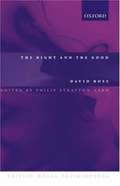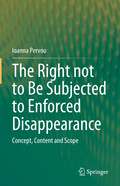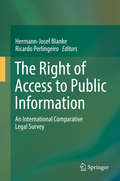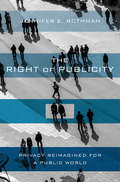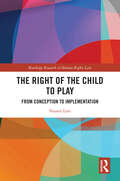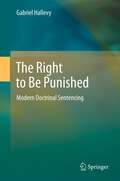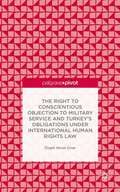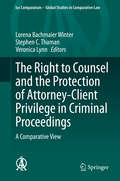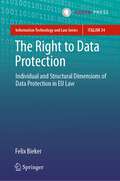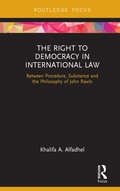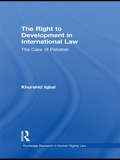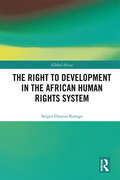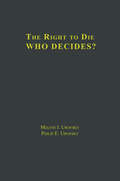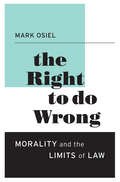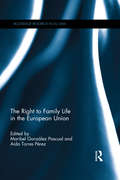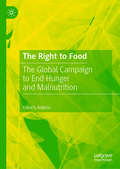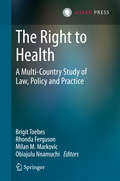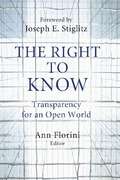- Table View
- List View
The Right and the Good
by Philip Stratton-Lake W. D. RossThe Right and the Good, a classic of twentieth-century philosophy by the eminent scholar Sir David Ross, is now presented in a new edition with a substantial introduction by Philip Stratton-Lake, a leading expert on Ross. Ross's book is the pinnacle of ethical intuitionism, which was the dominant moral theory in British philosophy for much of the nineteenth and early twentieth century. Intuitionism is now enjoying a considerable revival, and Stratton-Lake provides the context for a proper understanding of Ross's great work today.
The Right not to Be Subjected to Enforced Disappearance: Concept, Content and Scope
by Ioanna PervouThis book offers a distinctive approach to the right not to be subjected to enforced disappearance. Over the last decade, the entry into force of the UN Convention for the Protection of All Persons from Enforced Disappearance has brought to the forefront of legal discussion the need to effectively address the practice of disappearance. Yet, there are still obstacles to combatting it, which are in part due to a limited understanding of the right’s underlying concept, content and scope.This book examines the phenomenon and definition of enforced disappearance and sheds new light on the right against disappearance. Presenting a doctrinal appraisal of the norm’s legal value, it suggests that the right against enforced disappearance holds a customary value, while also arguing that it has since attained a jus cogens status. Lastly, it examines in detail the rights to truth and reparation and how regional and national courts have interpreted these norms. It assesses the UN Convention’s dynamics and considers whether the lack of a right against disappearance embedded in regional human rights systems affects individuals’ protection.The book provides an overview of key jurisprudence on disappearances, making it of benefit to both practitioners and theorists of international law.
The Right of Access to Environmental Information
by Sean WhittakerThe book discusses the normative impact of the Aarhus Convention on how England, America and China guarantees the right of access to environmental information. Through this analysis the book identifies each of these jurisdictions' unique conceptualisations of the right which, in turn, influences the design of their respective environmental information regimes. This allows these jurisdictions potentially to act as sources of legal reforms for each other to improve how the right is guaranteed via legal transplant theory, challenging the normativity of the Aarhus Convention. This is not to suggest that the Aarhus Convention exerts no normative influence on how the right is guaranteed; there are core substantive and core procedural elements which have to be met for the right to be effectively guaranteed, and the book shows that the Aarhus Convention does exert a normative influence over the procedural elements of the right.
The Right of Access to Public Information: An International Comparative Legal Survey
by Hermann-Josef Blanke Ricardo PerlingeiroThis book presents a comparative study on access to public information in the context of the main legal orders worldwide(inter alia China,France,Germany,Japan,Russia,Sweden,United States).The international team of authors analyzes the Transparency- and Freedom-to-Information legislation with regard to the scope of the right to access, limitations of this right inherent in the respective national laws, the procedure, the relationship with domestic legislation on administrative procedure, as well as judicial protection. It particularly focuses on the Brazilian law establishing the right of access to information, which is interpreted as a benchmark for regulations in other Latin-American states.
The Right of Publicity: Privacy Reimagined for a Public World
by Jennifer E. RothmanWho controls how one’s identity is used by others? This legal question, centuries old, demands greater scrutiny in the Internet age. Jennifer Rothman uses the right of publicity—a little-known law, often wielded by celebrities—to answer that question, not just for the famous but for everyone. In challenging the conventional story of the right of publicity’s emergence, development, and justifications, Rothman shows how it transformed people into intellectual property, leading to a bizarre world in which you can lose ownership of your own identity. This shift and the right’s subsequent expansion undermine individual liberty and privacy, restrict free speech, and suppress artistic works. The Right of Publicity traces the right’s origins back to the emergence of the right of privacy in the late 1800s. The central impetus for the adoption of privacy laws was to protect people from “wrongful publicity.” This privacy-based protection was not limited to anonymous private citizens but applied to famous actors, athletes, and politicians. Beginning in the 1950s, the right transformed into a fully transferable intellectual property right, generating a host of legal disputes, from control of dead celebrities like Prince, to the use of student athletes’ images by the NCAA, to lawsuits by users of Facebook and victims of revenge porn. The right of publicity has lost its way. Rothman proposes returning the right to its origins and in the process reclaiming privacy for a public world.
The Right of the Child to Play: From Conception to Implementation (Routledge Research in Human Rights Law)
by Naomi LottThis book provides a vital and original investigation into, and critique of, the situation facing the realisation of the child’s right to play. The right to play has been referred to as a forgotten right – forgotten by States implementing the Convention on the Rights of the Child, by the Committee on the Rights of the Child in monitoring and providing guidance on the Convention, and by human rights academics. Through multidisciplinary, original archival, novel doctrinal and primary empirical research, the work provides a thorough investigation of the right to play. It offers an innovative insight into its value, the challenges facing the realisation of the right, its raison d’être and its scope, content and obligations. It also critiques the Committee’s engagement with the right to play and shares lived experiences of efforts to support its implementation in the United Kingdom and Tanzania. The book highlights elements of best practice, challenges, and weaknesses, and makes recommendations for the continued and improved realisation of the right to play. The book will be a valuable resource for researchers, academics, advocates and policy-makers working in the areas of Children’s Rights, International Human Rights Law, Public International Law, Child Welfare, and Education.
The Right to Be Parents: LGBT Families and the Transformation of Parenthood
by Carlos A. BallThe Right to beParents is the first book to provide a detailed history of how LGBT parentshave turned to the courts to protect and defend their relationships with theirchildren. Carlos A. Ball chronicles the stories of LGBT parents who, in seekingto gain legal recognition of and protection for their relationships with theirchildren, have fundamentally changed how American law defines and regulatesparenthood. To this day, some courts are still not able to look beyond sexualorientation and gender identity in cases involving LGBT parents and theirchildren. Yet on the whole, Ball’s stories are of progress and transformation:as a result of these pioneering LGBT parent litigants, the law is increasinglyrecognizing the wide diversity in American familial structures.
The Right to Be Punished
by Gabriel HallevyDoes an offender have the right to be punished? "The right to be punished" may sound like an oxymoron, but it is not necessarily so. With the emergence of modern criminal law, the offender gained the right to be punished by rational criminal law rather than being lynched by an angry mob. The present-day offender may have the right to be punished by doctrinal sentencing rather than being subjected to verdicts based on vague, unclear, and uncertain principles. In modern criminal law, the imposition of criminal liability follows accurate and strict rules, whereas there are no similar rules for the imposition of punishment. The process of sentencing is vague and obscure, as are the considerations used for the imposition of punishments. The objective of the present book is to propose a comprehensive, general, and legally sophisticated theory of modern doctrinal sentencing. The challenges of such a legal theory are plenty and complex. In addition to increasing clarity and certainty, modern doctrinal sentencing must deal with modern types of delinquency (e.g. organized crime, recidivism, corporate offenders, high-tech offenses, etc.) and modern principles of criminal law. Modern doctrinal sentencing must serve to ensure optimal sentencing.
The Right to Conscientious Objection to Military Service and Turkey’s Obligations under International Human Rights Law (Palgrave Pivot)
by Özgür Heval ҪinarThis study examines Turkey's non-recognition of the right to conscientious objection to military service and locates this non-recognition within the context of international human rights law - specifically United Nations and European Union system.
The Right to Counsel and the Protection of Attorney-Client Privilege in Criminal Proceedings: A Comparative View (Ius Comparatum - Global Studies in Comparative Law #44)
by Stephen C. Thaman Lorena Bachmaier Winter Veronica LynnThe book provides an overview of the right to counsel and the attorney-client privilege in the following 12 jurisdictions: China, Germany, Greece, Italy, Japan, the Netherlands, Portugal, Spain, Switzerland, Turkey, UK and USA.The right to counsel is a fundamental right providing the accused access to justice in criminal proceedings. Lawyers can only practice their profession properly if clients have complete trust in their lawyer’s discretion. This trust is safeguarded by the attorney-client privilege, which is an indispensable part of every constitutional state and one of the most important professional duties of a lawyer. It is of particular importance in criminal proceedings regarding the protection of the confidentiality of lawyer-client communications in the different procedural stages, coercive measures as well as the various duties and interests in play. However, the communications protected by attorney-client privilege vary greatly from country to country. With regard to criminal investigations in an increasingly globalised world, where sophisticated tools enable broad digital investigations, there is an urgent need to clarify how this fundamental right is protected at both the national and supranational level. Each chapter explores the regulations, practices and recent developments in each jurisdiction and was written by highly qualified experts in the legal field – from academia and practice alike. It identifies possible solutions and best practices, providing valuable insights for practitioners and law-making bodies alike regarding the actual protection (or lack thereof) of lawyer-client confidentiality in the pretrial and trial stage of criminal proceedings.
The Right to Data Protection: Individual and Structural Dimensions of Data Protection in EU Law (Information Technology and Law Series #34)
by Felix BiekerThis book advances an approach that combines the individual and the structural, systemic dimensions of data protection. It considers the right to data protection under the EU Charter and its relationship to the secondary legislation. Furthermore, the case law of the Court of Justice of the EU as well as current academic conceptualizations are analysed. The author finds that current approaches invariably link data protection to privacy and often fail to address the structural implications of data processing. He therefore suggests a dualistic approach to data protection: in its individual dimension, data protection aims to protect natural persons and their rights, while the structural dimension protects the democratic society as a whole from the adverse effects of data processing. Using this approach, the full potential of an independent right to data protection can be realized. Researchers, practitioners and students will find this a valuable resource on the rationales, scope and application of data protection. Felix Bieker is Legal Researcher at the Office of the Data Protection Commissioner of Schleswig-Holstein (Unabhängiges Landeszentrum für Datenschutz) in Kiel, Germany.
The Right to Democracy in International Law: Between Procedure, Substance and the Philosophy of John Rawls (Routledge Research in International Law)
by Khalifa A AlfadhelThis book explores the right to democracy in international law and contemporary democratic theory, asking whether international law encompasses a substantive or procedural understanding of the notion. The book considers whether there can be considered to be a basis for the right to democracy in international customary law through identification of the relevant State practice and opinio juris, as well as through an evaluation of the Universal Declaration of Human Rights and whether the relevant provisions might be interpreted as forming customary law. The book then goes on to explore the relevant provisions in international treaties including the International Covenant on Civil and Political Rights before looking at the role of regional organizations and human rights regimes including the European Court of Human Rights and the Arab human rights regime. Khalifa A. Alfadhel draws on the work of John Rawls in order to put forward a theoretical basis for the right to democracy.
The Right to Development in International Law: The Case of Pakistan (Routledge Research in Human Rights Law #Vol. 3)
by Khurshid IqbalThe Right to Development in International Law rigorously explores the right to development (RTD) from the perspectives of international law as well as the constitutionally guaranteed fundamental rights and the Islamic concept of social justice in Pakistan. The volume draws on a wide range of relevant sources to analyse the legal status of international cooperation in contemporary international law, before exploring the domestic application of the right to development looking at the example of Pakistan, a country that is undergoing radical transformation in terms of its internal governance structures and the challenges it faces for enforcing the rule of law. Of particular importance is the examination of the RTD and Shari‘ah law in Pakistan which adds a new perspective to the RTD debate and enriches the discussion about human rights and Shari‘ah across the world. Through focusing on Pakistan the book links international perspectives and the international human rights framework with the domestic constitutional apparatus for enforcing the RTD within that jurisdiction. In doing so, Khurshid Iqbal argues that the RTD may be promoted through existing constitutional mechanisms if fundamental rights are widely interpreted by the superior courts, effectively implemented by the lower courts and if Shari‘ah law is progressively interpreted in public interest. Iqbal’s work will appeal to researchers, professionals and students in the fields of law, human rights, development, international law, South Asian Studies, Islamic law and international development studies.
The Right to Development in the African Human Rights System (Global Africa)
by Serges Djoyou KamgaThe right to development (RTD) seeks to address global inequities hidden in world politics and global institutions through the game of influences played by powerful actors. The negative impacts of the Atlantic slave trade, colonialism, and the subjugation of Africa through globalisation and its institutions are key factors that have caused Africa and African people claiming their RTD. This book examines how the African continent protects the right to development, examining the nature of the RTD and controversies surrounding it and how it is implemented. The book then goes onto explore the RTD at the regional level including through the jurisprudence of the African Commission and the African Court on Human Rights, at the sub-regional level including in sub-regional courts and tribunals, at the national levels through case studies and through the African Union governance institutions. Through this examination, the author unveils what are the prospects and challenges to the realisation of the RTD in Africa.
The Right to Die with Dignity: How Far Do Human Rights Extend? (European Union and its Neighbours in a Globalized World #6)
by Derya Nur Kayacan“Can I choose to die?” As the number of requests for euthanasia and physician-assisted suicide continues to rise, human rights law faces a new conflict: the right to die vs. the right to life… The right to die or, in other words, ‘the right to choose the time and manner of one’s own death’ is a question of personal autonomy and its limits. This book provides a comprehensive understanding of the right to die and sheds light on its possible future under the European Convention on Human Rights. After setting a clear framework by defining the key terminology, the book takes a two-part approach to achieving its aim. The first part focuses on the right to die in practice by examining selected jurisdictions. Switzerland, which is famous for its assisted suicide organizations, and the Netherlands, which was the first country to legalize euthanasia, are examined in detail. Belgium, Germany, the United Kingdom, and -as an exception to the Convention perspective - Canada are also included. While this examination offers a better understanding of what the right to die looks like in practice, it also provides insights on the slippery slope argument, which serves as a counterweight to personal autonomy, without making a definitive statement on its validity. This part also illustrates the different paths that led or did not lead to the right to die in practice. The second part is an analysis of the European Court of Human Rights case law on the right to die. The Court has made important statements in only very cases, while its caution when approaching such a delicate and controversial topic among its 47 members is understandably emphasized. This analysis of the Court’s approach to the balancing of personal autonomy against other interests allows us to take a look back at the practice in more permissive jurisdictions through the lens of the Convention. Taken together, the book’s two parts provide valuable lessons for countries that decide to practice assisted dying, which are outlined in the conclusion. In addition, given that a purely legal approach can only offer a partial picture, the book argues that an interdisciplinary approach would be much more favorable in terms of providing the necessary basis for the right to die debate.
The Right to Die: V1 Definitions and Moral Perspectives: Death, Euthanasia, Suicide, and Living Wills, V2 Who Decides? Issues and Case Studies
by Melvin I. UrofskyFirst Published in 1996. The key issue in all right-to-die matters is “who decides?” Who will decide whether life support should be terminated? Who will decide if a person is competent to make life and death decisions? The law is quite clear that, in cases of conscious, competent adults, the individual is free to make all decisions relating to his or her care and future. This volume is a collection of writings and case studies around the topics of personal choice, AIDS and informed consent, due process and the right to die.
The Right to Difference: French Universalism and the Jews
by Maurice SamuelsUniversal equality is a treasured political concept in France, but recent anxiety over the country's Muslim minority has led to an emphasis on a new form of universalism, one promoting loyalty to the nation at the expense of all ethnic and religious affiliations. This timely book offers a fresh perspective on the debate by showing that French equality has not always demanded an erasure of differences. Through close and contextualized readings of the way that major novelists, philosophers, filmmakers, and political figures have struggled with the question of integrating Jews into French society, Maurice Samuels draws lessons about how the French have often understood the universal in relation to the particular. Samuels demonstrates that Jewish difference has always been essential to the elaboration of French universalism, whether as its foil or as proof of its reach. He traces the development of this discourse through key moments in French history, from debates over granting Jews civil rights during the Revolution, through the Dreyfus Affair and Vichy, and up to the rise of a "new antisemitism" in recent years. By recovering the forgotten history of a more open, pluralistic form of French universalism, Samuels points toward new ways of moving beyond current ethnic and religious dilemmas and argues for a more inclusive view of what constitutes political discourse in France.
The Right to Do Wrong: Morality and the Limits of Law
by Mark OsielMuch of what we could do, we shouldn’t—and we don’t. Mark Osiel shows that common morality—expressed as shame, outrage, and stigma—is society’s first line of defense against transgressions. Social norms can be indefensible, but when they complement the law, they can save us from an alternative that is far worse: a repressive legal regime.
The Right to Equality in European Human Rights Law: The Quest for Substance in the Jurisprudence of the European Courts (Routledge Research in Human Rights Law)
by Charilaos NikolaidisA right to equality and non-discrimination is widely seen as fundamental in democratic legal systems. But failure to identify the human interest that equality aims to uphold reinforces the argument of those who attack it as morally empty or unsubstantiated and weakens its status as a fundamental human right. This book argues that an understanding of the human interest which equality aims to uphold is feasible within the jurisprudence of the European Court of Human Rights (ECtHR) and the European Court of Justice (ECJ). In comparing the evolution of the prohibition of discrimination in the case-law of both Courts, Charilaos Nikolaidis demonstrates that conceptual convergence within the European Convention on Human Rights (ECHR) and the EU on the issue of equality is not as far as it might appear initially. While the two bodies of equality law are extremely divergent as to the requirements they impose, their interpretation by the international judiciary might be properly analysed under a common light to emphasise the substantive dimension of equality in European Human Rights law. The book will be of great use and interest to scholars and students of human rights, discrimination law, and European politics.
The Right to Family Life in the European Union (Routledge Research in EU Law)
by Maribel González Pascual Aida Torres PérezExploring the main developments and challenges for the right to family life in the context of European integration, this book examines the right to family life in the EU Charter of Fundamental Rights and the interplay between family life, citizenship, and free movement; it analyzes the combined impact of the EU and the European Convention on Human Rights on the concept of the family protected by the law in light of recent case law. Considering the broadening understanding of what constitutes family, the challenges for the right to family life in the context of immigration, and the protection of families and social rights it provides a comprehensive overview of the current state of family life in the European Union.
The Right to Food: The Global Campaign to End Hunger and Malnutrition
by Francis AdamsThis book examines the global campaign to end hunger and malnutrition. Focus is placed on the work of the United Nations which has led international efforts to improve food security in the world’s poorest countries. The book first reviews the long-term project to establish access to safe, sufficient, and nutritious food as a universally recognized human right. This is followed by separate chapters that examine the nature and central causes of food insecurity in Latin America, Africa, the Middle East, and Asia. These chapters also review the contemporary work of three United Nations agencies – the World Food Programme, Food and Agriculture Organization, and International Fund for Agricultural Development – in providing both food aid and food assistance to each region of the developing world. This includes the provision of emergency food aid in response to natural disaster and civil conflict, as well as longer-term food assistance to promote agricultural productivity, advance rural development, and preserve natural environments. The concluding chapter considers ways to strengthen food aid and assistance in the years to come, with many of the recommendations advanced reflecting lessons learned from the actual experience of food aid and assistance described in this book.
The Right to Health
by Brigit Toebes Rhonda Ferguson Milan M. Markovic Obiajulu NnamuchiThis interdisciplinary study engages with the fields of human rights law, health law, and public health. It analyses how the internationally guaranteed human 'right to health' is realized by States at a national level. It brings together scholars from more than ten different countries, with each of them analyzing the right to health in their country or region. They all focus on a particular theme that is important in their country, such as health inequalities, the Millennium Development Goals, or the privatization of healthcare. This book is relevant for scholars, practitioners and policy makers in the field of human rights law, health law, public health and the intersection between these three fields.
The Right to Health Care: Ethical Considerations (The International Library of Bioethics #92)
by Eike-Henner W. KlugeThis book provides an in-depth ethical analysis of the right to health care by contrasting privatized with socialized approaches. It pays special attention to how a socialized approach can be implemented in the context of limited resources and offers a way of integrating allocation decisions at the policy level with institutional and hands-on decision-making. It also discusses how the right to health care translates into duties on part of the members of society. In an Appendix, it suggests how, in time of need, the TRIPS Agreement allows countries to side-step patent regulations that would otherwise raise the cost of patented healthcare products beyond what a particular society is able to afford. The book is of interest not only to scholars but also to healthcare policy makers, administrators and healthcare professionals, as well as to patients themselves.
The Right to Health at the Public/Private Divide
by Colleen M. Flood Aeyal GrossThrough a comparative global study of countries from all continents representing a diversity of health, legal, political, and economic systems, this book explores the role of health rights to advance greater equality through access to health care. Does health care promote equality, or does it in fact advance the opposite result? Does inserting the idea of "the right to health" into health systems allow the reinsertion of public values into systems that are undergoing privatization? Or does it allow for private claims to be rearticulated as "rights," in a way that actually reinforces inequality? This volume includes studies from countries such as the United States, the United Kingdom, Brazil, Canada, The Netherlands, China, and Nigeria, among many others, as well as authors with expertise regarding both the legal and health systems of their countries, making this a seminal study that allows readers to see the differing role of rights in various health systems.
The Right to Know: Transparency for an Open World (Initiative for Policy Dialogue at Columbia: Challenges in Development and Globalization)
by Ann FloriniThe Right to Know is a timely and compelling consideration of a vital question: What information should governments and other powerful organizations disclose? Excessive secrecy corrodes democracy, facilitates corruption, and undermines good public policymaking, but keeping a lid on military strategies, personal data, and trade secrets is crucial to the protection of the public interest. Over the past several years, transparency has swept the world. India and South Africa have adopted groundbreaking national freedom of information laws. China is on the verge of promulgating new openness regulations that build on the successful experiments of such major municipalities as Shanghai. From Asia to Africa to Europe to Latin America, countries are struggling to overcome entrenched secrecy and establish effective disclosure policies. More than seventy now have or are developing major disclosure policies or laws. But most of the world's nearly 200 nations do not have coherent disclosure laws; implementation of existing rules often proves difficult; and there is no consensus about what disclosure standards should apply to the increasingly powerful private sector. As governments and corporations battle with citizens and one another over the growing demand to submit their secrets to public scrutiny, they need new insights into whether, how, and when greater openness can serve the public interest, and how to bring about beneficial forms of greater disclosure. The Right to Know distills the lessons of many nations' often bitter experience and provides careful analysis of transparency's impact on governance, business regulation, environmental protection, and national security. Its powerful lessons make it a critical companion for policymakers, executives, and activists, as well as students and scholars seeking a better understanding of how to make information policy serve the public interest.
